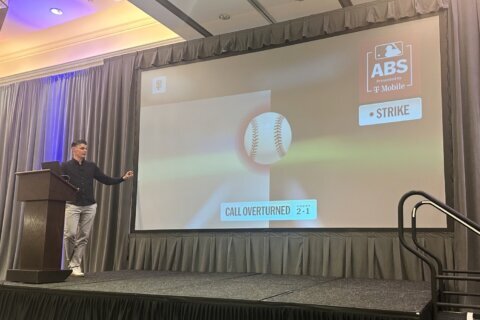WASHINGTON — If you’re a baseball fan, you’ve no doubt seen the numerous, sprawling handwringing think pieces about this year’s Hall of Fame election process. A number of circumstances have collided to create a ballot overflowing with worthy HOF candidates, some of whom will get shut out of baseball immortality not for any fault of their own other than bad timing.
Is all of this true? Yes. Does any of it matter? No, not really.
Before we get into why, let’s take a step back and look at what created this logjam and controversy in the first place. Disagreements between the eligible Hall of Fame voters in the Baseball Writers Association of America (BBWAA), a limit of 10 votes per ballot, and a backlog of Hall-worthy players has created a scenario in which deserving candidates may not only fall short of the required 75 percent vote to gain enshrinement but possibly even fall off the ballot entirely. The Hall cut short the window of eligible years on the ballot from 15 to 10, further exacerbating the issue. And while a proposal has been submitted to expand the votes per ballot to 12, such a change won’t go into effect until at least next year.
Many of the arguments you have seen and will continue to see between now and Jan. 6, when the voting is revealed, will revolve around the merits of arguments for each writer’s ballot, whom they included or excluded and why. Some will be civil in their discourse, while others will resort to name-calling. But they’ll all be missing the point.
The fact that we’re having these discussions, that we’re able to have them on a global scale, with writers and fans in dialogue with one another, is all that really matters.
The very reason so many of these arguments are being made now is that the modern sports fan has more access to statistical and historical information that the average sports information professional did as recently as 20 years ago. We can all become expert evaluators of how good players were, simply by comparing stats across generations of players. In an age where a decent percentage of fans are more well-versed in understanding the most important metrics of the game than old, get-off-my-lawny writers, who needs the Hall of Fame to validate greatness?
I understand the history. The National Baseball Hall of Fame is the oldest such sports museum in America, a living and ever-expanding catalogue of the game. A weight is added to someone’s name when they are called a Hall of Famer, especially they’re while still alive. But if a player such as Tim Raines is widely regarded as a Hall of Fame-worthy player who was simply never elected, what difference does the actual election make?
We now have case after case made for Raines, by Grantland’s Jonah Keri and Sports Illustrated’s Jay Jaffe and a number of other well-respected baseball writers. The writing on these topics is just as permanent now, in the Internet age, as any bronze bust in upstate New York, and infinitely more accessible by the next generation of baseball fans.
And that, ultimately, is what Cooperstown is about. It’s about passing the game on to your kid, with all the history and tradition you learned from your parents. Only now, that tradition is far easier to reach. So when your kid looks at Raines’ .385 career on-base percentage, the fact that he walked 364 times more than he struck out, and that he stole 808 bases at a nearly 85 percent clip, and asks you why he’s not in the Hall, you can explain the changes in the way the game has been viewed and that it was simply some obstinate, unadaptable dinosaurs that refused to accept them.
It’s not that the writers who do have votes shouldn’t take them seriously — I would absolutely do so, were I a voting member. But the fact that we’re having these discussions — not just now, but every day — means that the battle for a smarter sport is already being won.
Cooperstown is a fine stop on a summer vacation, a destination for fans of the game to see its history presented from humble beginnings to the multi-billion dollar industry it is today. But it is also just a museum. Baseball is an ongoing national conversation, and its legends will live on as a part of that discussion, bronze bust or not.
Follow @WTOP and @WTOPSports on Twitter and WTOP on Facebook.







